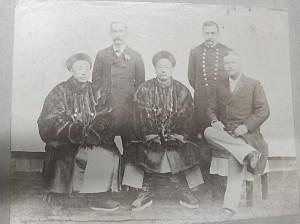Postcard (left), and unidentified photo (right) from the Albert W. Bash Papers
This week I’ve been working with a particularly fun collection- the Albert W. Bash papers- for an article I was writing for Wikipedia about the American China Development Company. After their defeat by Japan in the first Sino-Japanese war, 1894-1895, China turned to foreign powers to help rebuild the Chinese economy, by allowing such foreign entities to build and run railroads throughout China. Thus, at the turn of the century, many foreign companies were vying for “concessions” in China, and the American China Development Company was among them.
Here is where Bash comes in. Albert W. Bash was a businessman from Port Townsend, Washington, and was employed by the American China Development Company as an agent for the company’s interests in China. Because of this position, Bash made many trips to China, beginning in the spring of 1896. His papers include a wide range of material, but of most interest in my research was his correspondence- especially with the United States State Department, and with the Chinese government officials.
Bash’s papers are rife with the political intrigue that comes along with get-rich-quick schemes, but what I found so interesting about them is that for all the wheeling and dealing, all the negotiations between the U.S. and China over the course of about 8 years, there was almost no concrete evidence of any of the many deals that the two countries made. The American China Development Company only succeeded in building a mere 30 miles of railway line by the time the company lost its concession in 1905, despite the millions of dollars in bonds that the company had amassed from both China and foreign investors. And the American China Development Company was no small business venture- it was backed by the likes of J.P. Morgan, the Carnegie Steel Company, and the Presidents of the National Bank of New York and the Chase National Bank. Bash must have been quite a master of the ol’ smoke and mirrors strategy!
What could be better than pouring over the letters of shady, mustachioed businessmen? Clearly I’m spending my summer the right way.
The three American men above appear in multiple photographs from the collection, and are identified as the members of the United States Cheng Tu commission (from left to right): Secretary of the U.S. Legation in Peking, F.D. Cheshire, Lieutenant Merrill, and U.S. Consul, S. P. Read. The two Chinese men are not identified.
By: Kara E. Flynn



